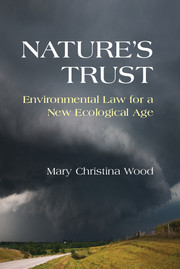Book Review
ARTICLE | September 16, 2014 | BY Robert Hoffman
Wood, Mary Christina. (2014) Nature’s Trust: Environmental Law for a New Environmental Age. New York: Cambridge University Press.
Review by Robert Hoffman
 Nature’s Trust is a must read for those interested in the issues of governance of the commons and the rule of law that were important topics for discussion at the Annual General Congress and Conference of the Club of Rome held in Ottawa, September 2013.
Nature’s Trust is a must read for those interested in the issues of governance of the commons and the rule of law that were important topics for discussion at the Annual General Congress and Conference of the Club of Rome held in Ottawa, September 2013.
Mary Christina Wood, University of Oregon School of Law, makes the case that the spate of environmental laws enacted in the 1970s have not only failed to protect the environment as was intended but they have legalized its destruction. Many of these laws established agencies, such as the Environmental Protection Agency, with mandates to establish regulatory frameworks for protecting endangered species, ensuring clean water and clean air and for promoting stewardship of natural resources. Often these agencies issue permits giving corporate interests the right to take water, to release pollutants into air and water, to harvest fish, and to take timber from crown lands.
These agencies have been easy prey for corporate interests and the politicians whose campaigns are funded by those interests. A number of strategies are used that have been effective in perverting the original intent of these agencies. Insofar as regulatory frameworks are based on scientific consensus, corporate interests have succeeded in casting doubt in scientific consensus, thereby delaying the adoption of regulations and weakening their provisions. Senior agency officials are political appointees often appointed from senior positions in the industries subject to regulation, resulting in failure to prosecute violators, reduced enforcement effort, lack of due diligence in permitting, suppression of agency scientific findings, and dismantling of monitoring programs. The agencies are fragmented and overlapping in jurisdiction adding layers of complication and opportunity for corporate interests to obtain permits from one agency that negates the mandates of other agencies.
The establishment of these environmental laws represented a major shift in power from the judiciary to the executive. The long established legal principle known as public trust doctrine rests on a civic and judicial understanding that some natural resources are so vital to public welfare and human survival that they should not serve private interests to the exclusion of the public good. Under public trust doctrine, such natural resources remain common property belonging to the people as a whole. Such assets take the form of a perpetual trust for future generations. Public trust law demands that governments act as trustee in controlling and managing natural assets. Governments are obligated to promote the interests of citizen beneficiaries and ensure the sustained resource abundance for society’s endurance.
The author concludes that instead of incremental reform, the present circumstances call out for a fundamental reform that infuses all government decision making with its responsibility for stewardship. Citizens must tap a wellspring of legal obligation to compel their governments to act accordingly.
- Login to post comments
